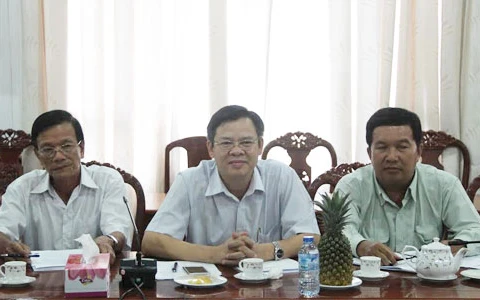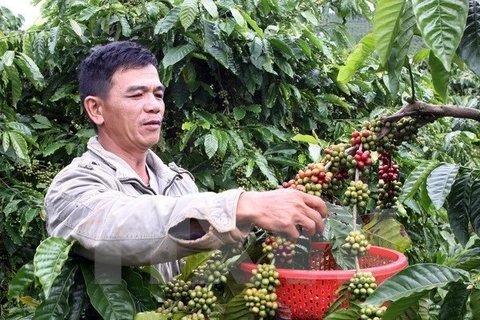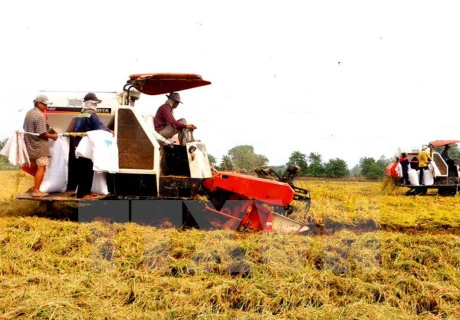Hanoi (VNA) – The World Bank-funded project “Vietnam Sustainable Agriculture Transformation” (VnSAT) has quality over quantity in farming since it started two years ago.
The project aims to improve farming practices and value chains in rice and coffee farming in the Mekong Delta and the Central Highlands, the two major good commercial production areas in Vietnam and promote institutional strengthening of public agencies to help implement the country’s agricultural restructuring plan.
After two years of implementation, the project has established a complete organisational structure from central to grassroots levels and carried out a range of tasks.
By May 2017, the VnSAT had assessed 75 farmer organisations with a total of 2,785 households growing rice and 776 others planting coffee that were provided with training on new cultivation techniques – “three reductions, three gains (3R3G)” and “one must, five reductions (1M5R)” a year ago.
3R3G refers to reductions in seed, chemicals, and water and gains in productivity, quality, and economic efficiency while 1M5R means using registered seeds and reductions in seed, chemical fertiliser, pesticide, water use and post-harvest losses.
The results show that some 36 organisations, or 48 percent, have more than 50 percent of their households or growing areas using the practices.
The Mekong Delta province of Tien Giang, and the Central Highlands provinces of Dak Lak and Lam Dong led the way with all of their farmer organisations achieving positive results.
The majority of organisations in Mekong Delta provinces have seen lower prevalence of the new techniques due to local tradition of sowing by hand that did not allow peasants to effectively control the number of seedlings planted on each hectare. As a result, the number was usually above the project’s requirements.
In the Central Highlands, most organisations have not met criteria in terms of shade tree, organic fertiliser and production recording.
The VnSAT also evaluated the capability of the organisations to measure their needs of investment in warehouses, drying yards, pumping stations and roads.
The workshop to review the implementation of the project during the first half of 2017 proposed the organisations buy sowing machines and teach farmers how to use them effectively.
Sergiy Zorgya, a senior agricultural economist from the World Bank, said to effectively carry out the project, it is necessary to learn from the real demand of farmers to design effective support for them. -VNA
The project aims to improve farming practices and value chains in rice and coffee farming in the Mekong Delta and the Central Highlands, the two major good commercial production areas in Vietnam and promote institutional strengthening of public agencies to help implement the country’s agricultural restructuring plan.
After two years of implementation, the project has established a complete organisational structure from central to grassroots levels and carried out a range of tasks.
By May 2017, the VnSAT had assessed 75 farmer organisations with a total of 2,785 households growing rice and 776 others planting coffee that were provided with training on new cultivation techniques – “three reductions, three gains (3R3G)” and “one must, five reductions (1M5R)” a year ago.
3R3G refers to reductions in seed, chemicals, and water and gains in productivity, quality, and economic efficiency while 1M5R means using registered seeds and reductions in seed, chemical fertiliser, pesticide, water use and post-harvest losses.
The results show that some 36 organisations, or 48 percent, have more than 50 percent of their households or growing areas using the practices.
The Mekong Delta province of Tien Giang, and the Central Highlands provinces of Dak Lak and Lam Dong led the way with all of their farmer organisations achieving positive results.
The majority of organisations in Mekong Delta provinces have seen lower prevalence of the new techniques due to local tradition of sowing by hand that did not allow peasants to effectively control the number of seedlings planted on each hectare. As a result, the number was usually above the project’s requirements.
In the Central Highlands, most organisations have not met criteria in terms of shade tree, organic fertiliser and production recording.
The VnSAT also evaluated the capability of the organisations to measure their needs of investment in warehouses, drying yards, pumping stations and roads.
The workshop to review the implementation of the project during the first half of 2017 proposed the organisations buy sowing machines and teach farmers how to use them effectively.
Sergiy Zorgya, a senior agricultural economist from the World Bank, said to effectively carry out the project, it is necessary to learn from the real demand of farmers to design effective support for them. -VNA
VNA























